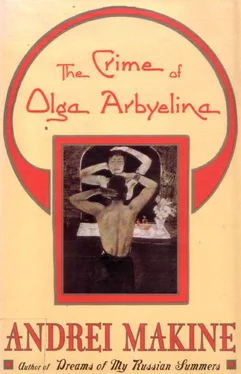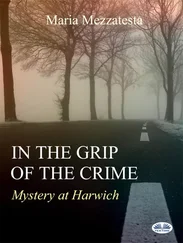Yes, the whole of the war came down to that return from the market, to her fear lest the child should see the beautiful bird transformed into a piece of food… He had been seven years old when they left Paris and came to Villiers-la-Forêt in the spring of 1939. Seven years plus six more, lost in the war. Plus this year, '46, that would soon be finished. Fourteen.
In any case, the émigrés, especially those living at the Caravanserai, inhabited a very singular time. A time made up of their Russian past, from which they emerged sometimes, into the midst of French life, distraught, clumsy, and continuing, as soliloquies, conversations begun in their former lives. They were all stuck at the age of their last years in Russia. And nobody was surprised to see a man with gray hair leaping about like a little boy as he acted out saber fights, fiery cavalry charges, and decapitations…
Thinking one day about the child who had not changed in her mind over so many years, she pictured him dressed up as a young sentry… Some time before their separation her husband had taught the child to stand guard in the hall of their apartment in Paris. The child put on a tunic she had made for him out of her husband's old uniform, took his wooden rifle, and stood solemnly at attention, rooted to the spot, listening for the sound of footsteps on the staircase. After their split and his father's departure, he had continued to mount guard for several weeks. She would see his little silhouette, motionless in the dark hall, and longed to explain everything to him, but her courage failed her: his father had supposedly gone away on a long trip, a very long one. The child had guessed for himself and had abandoned his guard duties. As if he had perceived his mother's unease and wanted to protect her from any further pain…
For her, since then, he had always been that silent child on secret and desperate sentry duty.
On the day of Xenia's funeral everyone in the little Russian church at Villiers-la-Forêt made a surprising discovery, apparently banal, but all the more striking for that: people at the Caravanserai died just like everywhere else, they grew up and became old there-and a whole generation of Russians had been born on this foreign soil, all these young people who had never seen Russia. Like Princess Arbyelina's son, for example, standing there behind a pillar, staring curiously at an icon turned brown by the candle flames…
Olga listened, without really hearing, to the voice of the priest and the vibrant resonance of the choir and was amazed at the triviality of the thoughts that such a solemn moment could not banish. Again she recalled Xenia 's dream: of going to pick the mysterious white flowers in the woods behind the Caravanserai in springtime. "But what is left of that dream now?" The question seemed stupid. And yet Olga sensed that by replying "Nothing!" she would have betrayed someone who was listening to her thoughts. She saw the outline of Xenia 's pale face in the midst of the white ornamentation of the coffin. And this question whose naïveté had irritated her- "What will be left of the woods in spring?"-suddenly touched the very essence of her life; of the lives of all these people, who were so different, packed together beneath the low vault of the church; of the life of this blue fall day, whose sky could be glimpsed when a latecomer timidly opened the door…
At that moment she saw her son half hidden by a pillar. The sight of this young adolescent mingling with the others, detached from her, independent and lost in his own thoughts, caused such radiant and poignant tenderness to well up in her that she had to close her eyes.
That same evening, as night was falling, Olga noticed underneath the kitchen sideboard an orange crayon that had rolled into a narrow and dusty corner, out of reach of the coming and going of the dust-mop…
The infusion of hop flowers was cooling in its little copper saucepan. As before… The hour was striking in the distance, but the trees around the Caravanserai, now bare, had lost their musical resonance. While she was waiting Olga was cleaning the floor: coming into a spruce kitchen in the morning would make it easier to begin her day, she thought. However, she was also angry with herself over all these little weaknesses that were destined to fill her days from now on.
She saw the crayon without immediately noticing its color. Her hand patted the dust a couple of inches away from its hiding place but could not reach it. She crouched down even lower, her face almost on the ground, her arm outstretched, her shoulder pressed against the corner of the sideboard. Some kind of superstitious whim impelled her on this quest… Several broad swings of the floor cloth finally swept out the crayon. It rolled across the floor with a thin rattling sound. It was the crayon she had seen slipped into her son's notebook. An orange crayon. She removed the dust from it, washed her hands. And suddenly the gleaming color blinded her. "But it's the same as…," she murmured, and in a trice she was walking down the corridor and pushing open the door into the book room.
She climbed onto a chair and took down several volumes at random from the farthest corner of the bookshelf. Opened one, then another. Here a paragraph was marked with a vertical line, there a sentence with a horizontal line, almost on every page. They were medical books dealing with diseases of the blood. Her son's illness in particular.
She had always thought the lines on it, drawn with heavy pressure, were the result of her husband's readings. She had often pictured him thus: a man with his brow furrowed by grief, his eyes raw, scanning these paragraphs for reasons to hope. She had forgiven him a good deal, almost everything, because of those pages marked with orange… The last two books on that shelf had been purchased after they split up. Standing on tiptoe she managed to grasp them. The pages fluttered in a hasty fan beneath her hands. They, too, carried the marks of the orange crayon.
The contents of these two books were well known to her, down to the very chapter divisions, and in one of them down to the transparent mark on page 42, which looked like melted candle grease. She was not reading but hearing the intonation of her own voice that had silently pronounced every one of these words so many times, hoping to come upon an encouraging prognosis, a new treatment… And now she could feel her son's eyes resting on these pages. She looked up, still incredulous, and murmured: "So he knows all this…" Then looked again at the sentences he had underlined.
"A hemophiliac should work in an office and should not undertake heavy manual work…"
"Ninety per cent of hemophiliacs do not reach the age of twenty…"
"Transmission can skip one or two generations…"
"One of the hemophiliacs followed up by Professor Lacombe had developed ankylosis of all four knee and elbow joints, to the extent of being effectively incapacitated…"
"Without repeated transfusions these losses of blood would have caused death…"
"He attended a different department where he was not transfused and died of a hemorrhage…"
"Injection of calcium chloride causes no problems whatever in man, though intravenous injection of as little as 50 cg of this salt may be enough to kill off a large dog within a few seconds…"
"Following the taking of an ordinary blood sample a hematoma developed, extending from the shoulder to the middle of the forearm…"
"Sufferers must be forbidden to marry…"
"According to Carrière, 45 percent of hemophiliacs die before reaching the age of four, and only 11 percent reach the age of twenty…"
"In the night the patient several times vomited black blood…"
On one of the pages a big mark had been made, still in orange crayon, against a strange genealogical tree: the hereditary and familial antecedents of a hemophiliac. Olga knew this anonymous family like her own, with which she had often compared it.
Читать дальше












